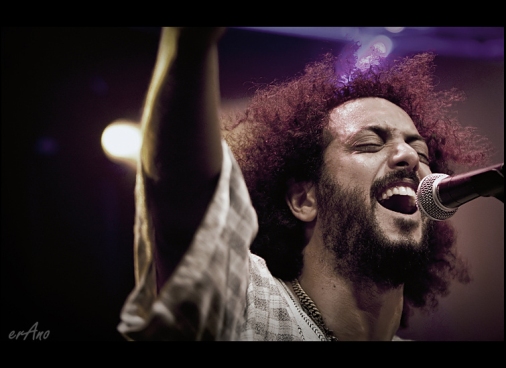
Ravid Kahalani is a 30-year old Israeli vocalist with eclectic musical tastes and a singular responsiveness to that universal and mystical thing called soul. “Yemen Blues” is the name of Kahalani’s new musical project, and it’s a heady and explosive brew of Yemenite-Jewish piyyut, West African music, and American Jazz and blues. At a performance at Jerusalem’s Yellow Submarine nightclub at the end of September, Kahalani’s soulful sound struck a deep chord with an ecstatic crowd.
Kahalani earned his openness the hard way. Raised in a religious, Yemenite-Jewish home in a small West Bank settlement, he left both religion and his community in order to journey around the musical universe ― with an extended excursion into American blues and funk. Kahalani emerged from his musical wandering an artist in his own right, appearing in recent years with the popular Idan Raichel project.
But make no mistake; Kahalani doesn’t make ‘world music.’ As he emphatically insists about “Yemen Blues,” “This isn’t fusion.” Instead, Kahalani goes to the roots and learns how to control the fundamental musical elements that he’s working with. What Kahalani hears in different musical traditions is the power of soul, a power that comes through in different languages ―in “Yemen Blues” he sings in Creole, Moroccan Arabic, Yemenite Arabic, and Hebrew ― and in different melodies, but is fundamentally one. Deeper, for Kahalani than religion, never mind politics.
Kahalani is a young man at 30, but he’s already been rambling long enough for him to revisit his Yemenite musical roots. The opening night at Jerusalem’s recent piyyut festival was devoted to Yemenite liturgical music, and Kahalani gave an impassioned performance with some of the Yemenite greats. But at times the stage was too small for his musical drives: Kahalani added Sly Stone-style growls and shouts to his rendition of classic Yemenite songs, which is not the way things are done. Occasional peals of nervous laughter could be heard together with the applause.
The crowd at the warehouse-hip Yellow Submarine proved to be more receptive. The rolling rhythms common to Yemenite music and Saharan musical styles, from the Sudan to Mali, propelled the crowd for most of the night, and the sound was opened up by Kahalani’s top-notch and wonderfully unconventional band that includes a cello, violin, flute, trumpet, trombone, electric bass and two percussion players. Three of the musicians are critically acclaimed Israeli jazz musicians, including the bassist Omer Avital, who arranged Kahalani’s compositions and replaced his bass with the oud on a few pieces. The “brass section” sometimes danced the Yemenite step, Temptations-style, and punctuated Kahalani’s vocals with James Brown-like exclamation points.

During the show, Kahalani drew on both on the blues and West African falsetto vocal modes, as in the 90-second Led Zepplin-like bang that opened the show. At other times the band worked the crowd into a frenzy by transforming traditional grooves into life-affirming riffs while Kahalani descended to play with the more primal powers of his voice. The absence of a guitar and keyboard left room for a kind of raw, harmonic openness, and the flute, trumpet, and trombone occasionally filled in the sparse acoustic background with playful rhythmic lines.
Ultimately, Kahalani’s real innovation is his approach to tradition. He’s not only engaged in a dialogue with particular traditions, he’s engaged in a dialogue with the very concept of ‘tradition.’ He believes in the unity of soul that you hear in different traditions ― Yemenite-Jewish, West African, and American. Soul, however, never reveals itself in the abstract. It takes on different forms by emerging in particular contexts, and if you’re serious about gaining access to the particular revelation of soul embodied in a certain tradition, as Kahalani is, you need to go to school and learn how the tradition works, as Kahalani did.
That said, Kahalani knows from experience that traditions are by definition limited, and limiting. Being one tradition among many, they take back what they give, namely, access to the power of soul. Kahalani’s music is in this sense a deeply unsettling force. Kahalani might have revisited his Yemenite roots, but the very manner of his return poses a powerful challenge to the excessive love of one’s own.
“Yemen Blues” is due to be released on disk in Israel in January. An introduction to their sound can be enjoyed on youtube:
Aryeh Tepper is a contributing editor at Jewish Ideas Daily. Press on this link to read his piece on the Israeli Jazz scene.





